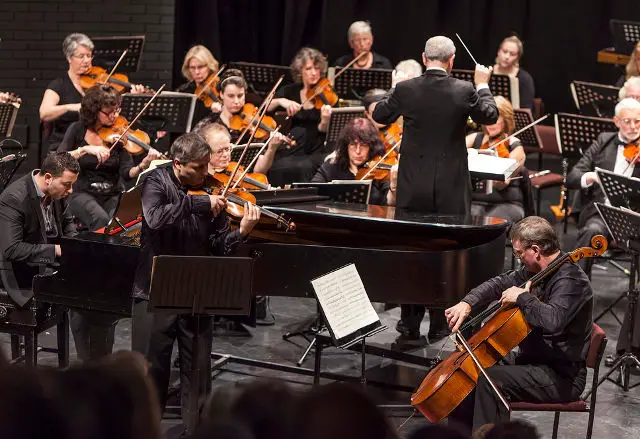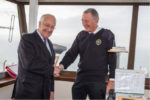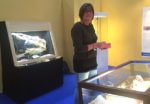Jonathan Dodd shares his review of the latest Isle of Wight Symphony Orchestra (IWSO) concert. Ed
The new season of Isle of Wight Symphony Orchestra concerts started with a bang last Saturday night at the Medina Theatre. Despite the torrential rain, the theatre was completely filled and everybody was expecting a memorable evening. I surprised myself by actually recognising a theme from the Rite of Spring played by a bassoon during the warm-up. At least I think it was. I like to think that I would love to play in the orchestra if I had any musical ability or knowledge. Note to that bassoonist: if you did, thank you.
Jonathan Butcher introduced the programme and welcomed everyone, regulars and new converts, to the new season. He told us that there would be two ‘firsts’, one of which had never been played by anyone in the orchestra before, and another being the first time that three soloists would be playing with the orchestra. And of course there was the star attraction, the popular Enigma Variations by Edward Elgar.
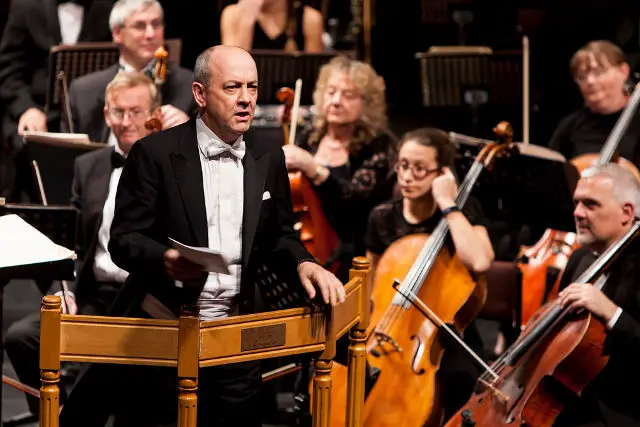
Poor Yorick the late jester fondly remembered by Hamlet
First we were treated to the most unfamiliar work, the Yorick Overture, by Geoffrey Bush, whose widow was among the audience. Mr Butcher explained that Bush deserved more attention than he has so far been given, and the spirited rendition by the IWSO hopefully will help this work gain more recognition.
The Yorick Overture was written after the Second World War at the request of the National Association of Boys’ Clubs after the death of their patron Tommy Handley, a hugely popular radio comedy star during the war. Bush immediately thought of Poor Yorick the late jester fondly remembered by Hamlet. The piece was filled with light and sombre moments and was very tuneful, with lovely solos for violin and woodwind instruments. I shall find this and listen again.
This is Classic Beethoven
After the Overture there was a mini-break while the whole orchestra reorganised themselves to allow space on the stage for a grand piano and a violinist and a cellist, because the other ‘first’ was to be the Triple Concerto for Violin, Cello and Piano by Beethoven. The soloists were the Stankov Ensemble, brothers Ivo and Lachesar Stankov from Bulgaria, playing the violin and piano, and Gerard Le Feuvre playing Cello.
To my ear, this is Classic Beethoven, instantly recognisable and somehow reassuring. The orchestra played beautifully, adding the background to the three soloists as they alternated their lead roles. I have not paid attention to triple concertos before. Where there’s a single soloist, you can concentrate entirely on the one instrument, and if it’s a duet, you can enjoy the interplay between the two distinct voices or sounds.
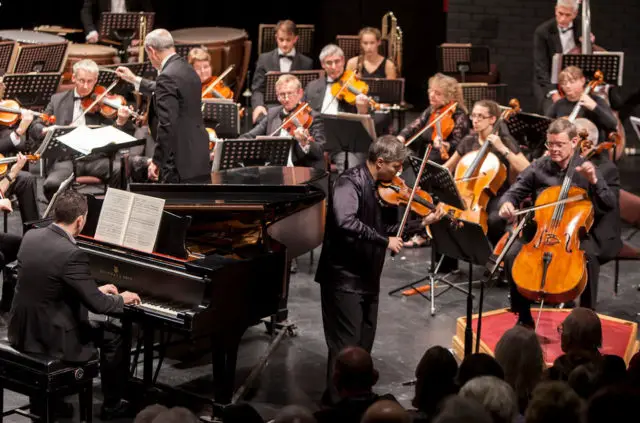
I watched and listened as the three soloists took turns to join together or support or counterpoint each other, in a dizzying variety of ways. I particularly enjoyed the interplay between the violin and cello, with the piano supporting, and there were moments of sheer beauty and virtuosity from all three, taking and swapping the lead. It was fascinating to watch them work as a team. I really liked it, particularly the first movement and the finale. Another piece to listen to again.
Calm Sea and Prosperous Voyage
After the interval the orchestra played the overture ‘Calm Sea and Prosperous Voyage’, by Mendelssohn. This was a musical depiction of two poems by Goethe, describing first a sea becalmed, which could be disastrous in the days of sail, and then the happy busyness of sailing home with a favourable wind. Part overture, part tone poem, this captured the slow, calm uneventfulness of a windless time, with undertones of fear and uncertainly.
The faint first rising of the wind, signalled by a solo flute, allowed the whole orchestra to contribute to the growing movement as the ship speeds towards its destination, with a wonderful fanfare from the trumpets as it sights land, and finally reaches harbour. This overture was lovely, and I found I could appreciate its shape and form even without knowing what it was about, and enjoyment that was increased by reading the concert notes afterwards.
A particularly English kind of music
The finale of the evening was a most famous work, known to everybody everywhere, even if they have no idea who wrote that particular tune or why. The Enigma Variations have become almost synonymous with a particularly English kind of music, and is loved and appreciated universally. Many of us, including me, have never had the opportunity to listen to it performed live, and I was looking forward to it eagerly.
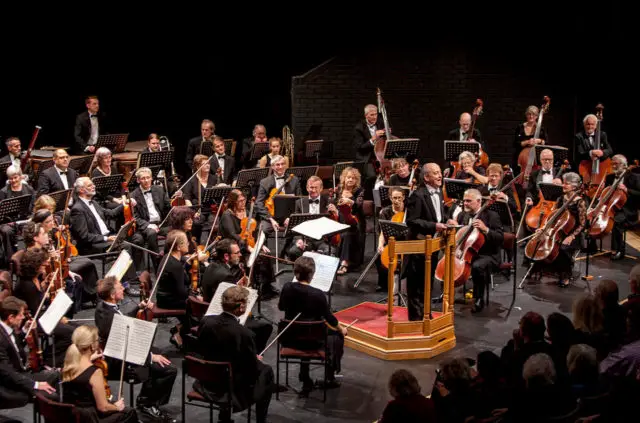
It was hugely popular at the time, and it contained various puzzles which caught the imagination of the public. It also made Elgar’s name and fortune. Much has been written about where the original theme comes from, and who were the subjects of each of the variations. The theme of ‘Nimrod’ is played at great occasions and has become part of our national heritage.
Each as accurate as a portrait painted by a great artist
I hadn’t read the concert notes before settling down to listen, and I was aware of some of the legend, but from the first notes I was caught up in the same excitement and delight that I imagine the first audience felt. Even a musicological dunce like me could hear each variation as a completely different piece of music, but also detect some of the threads of the theme as they wove in and out of the melody or the harmony, almost out of reach.
Each variation has a distinct character, and although I didn’t know any of the people described musically, I could sense that Elgar knew them very well and was painting a portrait of them, each as accurate as a portrait painted by a great artist. Although I had heard the Variations before, I had never really listened, and the experience of hearing it played was so much more real and nuanced than I expected.
A lovely way to end the evening
I can’t point to any particular great moments from any one musician in the orchestra, because there were so many of them. They all played magnificently, on their own and together, and they made the Variations come alive for me in a way that will stay with me every time I listen to them again.
There was even an encore, a dance from music he wrote in tribute to holidays in Bavaria with his wife Alice, who wrote the poems to which it was set. This was a lively dance in the German style, and a lovely way to end the evening. There is truly no better way to appreciate great music than to hear it played live, and I can’t fully thank the Isle of Wight Symphony Orchestra for providing these concerts for me to listen to.
I know I’ll know it a lot better once I’ve heard it live
I haven’t properly paid tribute before to the excellent programme notes provided by Jane Pelham. She is a proper musical expert, and her erudite notes are essential to me (along with Google) in the writing of these reviews. Thank you Jane.
The next concert will take place on Saturday 21st January 2017. There will be the Elegy for Brahms by Parry, which I’ve never heard, but I’ll enjoy discovering. There’s the Violin Concerto in D by Brahms, which will be very exciting, and I’m personally looking forward very much to Rimsky Korsakov’s Sheherezade, which I think I know, but I know I’ll know it a lot better once I’ve heard it live.
I can’t wait. See you there.
Image: © With kind permission of Allan Marsh

